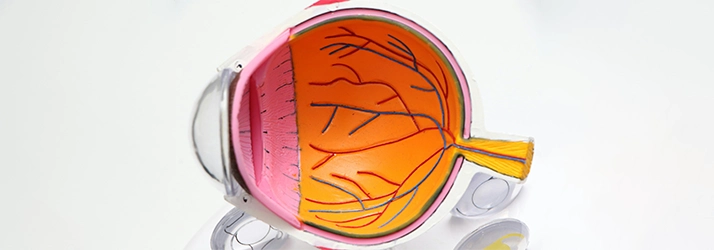Protecting Your Vision for the Long Term: Glaucoma Management at Eyes of the Bay

Glaucoma is often referred to as the "silent thief of sight" because it progressively damages the optic nerve, typically without any noticeable symptoms in its early stages. If left untreated, this can lead to irreversible vision loss.
At Eyes of the Bay, we provide comprehensive glaucoma screening, diagnosis, and management to protect your vision. Under the care of Dr. Cindy Pouw, our practice is dedicated to early detection and creating individualized treatment plans. Through continuous monitoring and the use of modern technology, our goal is to slow the progression of the disease and preserve your quality of life.
Whether you are at risk or are currently managing glaucoma, we provide expert, compassionate care tailored to your needs.
Learning about Glaucoma
Glaucoma is not a disease or illness, but rather a group of eye diseases that damage the optic nerve, typically due to elevated intraocular pressure (IOP). The pressure will eventually kill the optic nerve fibers, which transmit visual data from the eye to the brain. As the damage progresses, it leads to gradual vision loss, starting with peripheral (side) vision and eventually affecting central vision if left unmanaged.
The most common people are:
- Primary Open-Angle Glucoma (POAG): Most frequent, usually progressive, and symptomless in the initial stage.
- Angle-Closure Glaucoma: A less common form that may develop quickly and produce sudden symptoms.
- Normal-Tension Glaucoma: Where IOP is normal, but with possible impact on other risk factors, such as impaired blood supply.
- Secondary Glaucoma: Arises from other eye conditions, trauma, or medications.
- Congenital glaucoma: A rare type present at birth or early infancy.
Are You at Risk?
Glaucoma can affect anyone, but you have specific risk factors that put you at greater risk of developing it:
- Age of 40 years and older, especially after 60 years
- Family history of glaucoma
- African, Asian, or Hispanic descent
- Elevated eye pressure (intraocular pressure)
- Thin cornea
- Diabetes or hypertension
- Corticosteroid medication used over a prolonged period
- History of eye trauma
Our Glaucoma Screening and Diagnostic Process
At Eyes of the Bay, we strongly believe in early detection as a primary goal. Our glaucoma screening includes:
- Comprehensive Eye Exam
It begins with a general evaluation of your eye health, including measurement of visual acuity, examination of your medical and family history, and a conversation with us about any symptoms or changes you have experienced in your vision.
- Intraocular Pressure Measurement (Tonometry)
We check your eye pressure with applanation or non-contact tonometry. While high pressure is a major risk factor, it's not the only indicator to rely on.
- Visual Field Testing
This test assesses your side vision to detect early damage to your optic nerve, which you may not even notice.
- Optic Nerve Imaging
With fundus photography and OCT, we illustrate to you in explicit pictures your optic nerve. The new equipment enables Dr. Pouw to monitor minute changes over decades and diagnose damage at the earliest stage of development.
- Gonioscopy
We also perform gonioscopy for other indications to view the angle where the iris and cornea meet, allowing us to determine the type of glaucoma you have and how you should be treated.
Individualized Treatment and Regular Monitoring
If you have glaucoma or are at risk, Eyes of the Bay can provide you with a personalized treatment plan to control your condition and avoid visual loss.
You could be treated with:
- Prescription Eye Drops
Eye drops are typically the first choice of treatment. They decrease intraocular pressure by either slowing the production of fluid or enhancing drainage from the eye. Dr. Pouw will select the most effective medication based on your type of glaucoma and medical history.
- Oral Medications
Sometimes, oral medications are used to supplement or substitute for eye drops in controlling pressure.
- Laser Treatment
If that does not work, laser treatment is utilized to allow for drainage of fluid and decrease IOP. Some examples are:
- SLT (Selective Laser Trabeculoplasty) for open-angle glaucoma
- Peripheral Iridotomy for angle-closure glaucoma
- Referral for Surgical Intervention
For more advanced or resistant cases, Dr. Pouw may refer you to a glaucoma surgeon for procedures such as trabeculectomy or shunt implantation, which create alternative drainage paths in the eye.
- Long-term Follow-up
Glaucoma requires lifelong follow-ups. We use regular pressure tests, visual field testing, and nerve scans to monitor your status, ensuring that your treatment remains effective. We have to be flexible as necessary to adjust to the changing needs of your eye.
A Partner in Your Eye Health
We'd rather see ourselves as your long-term vision partner at Eyes of the Bay. Dr. Cindy Pouw is dedicated to delivering individualized, evidence-based glaucoma care to you and educating you on the facts, so that you can be an informed member of your treatment team.
We know that knowing about glaucoma can be confusing. That's why we focus not only on treatment but on education, support, and compassionate care. We guarantee to make your choices clear and understandable, respond to your questions, and help you become a knowledgeable member of your eye care team.
Empowering You with Preventive Care
Prevention is also the patient's path to glaucoma diagnosis. A comprehensive eye exam often allows us to monitor changes, recognize early risk factors, and treat conditions before permanent damage occurs. We also promote:
- Annual eye exam for 40-year-old patients and above
- Checkup every 1–2 years in high-risk patients
- Optic nerve imaging as a baseline in patients
- Control of blood pressure and eye movement by life changes
Technology Designed to Drive Precision
At Eyes of the Bay, we utilize state-of-the-art diagnostic technology to precisely manage glaucoma. Accurate diagnosis and monitoring are the foundation of effective, non-surgical glaucoma treatment.
Our advanced instrumentation, which includes Optical Coherence Tomography (OCT), visual field examination, and digital tonometry, enables us to:
- Detect the earliest signs of glaucomatous damage.
- Track the condition's progression with high precision over time.
- Refine your treatment plan with the most accurate data available.
This combination of advanced technology and the clinical expertise of Dr. Cindy Pouw enables us to provide a proactive and personalized approach to preserving your vision.
Take the Next Step Toward Lifelong Vision
Glaucoma is a lifelong condition, but with proper care, vision loss can be prevented or significantly slowed. Whether you're concerned about risk factors, seeking a second opinion, or managing an existing diagnosis, Eyes of the Bay is here to help.
Our skilled professionals are here to guide you through every step, from testing to specialty care, with precision, care, and dependability. Save your vision today and take control of your eye care.
OFFICE HOURS
Monday
Closed
Tuesday
10:00am - 6:00pm
Wednesday
10:00am - 6:00pm
Thursday
10:00am - 6:00pm
Friday
10:00am - 6:00pm
Saturday
10:00am - 6:00pm
Sunday
Closed
Eyes of the Bay
415 University Ave
Palo Alto, CA 94301


